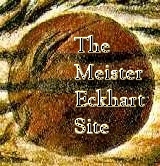|
|
||
 |
Meister Eckhart Home / Works by Meister Eckhart - Quotes / Inspired by Eckhart / Studies / The Papal Condemnation / Mail & Announcements / Links / Books |
AMY HOLLYWOOD
From: M. Rubin, W. Simons (ed.), The Cambridge History of Christianity, v. 4, Christianity in Western Europe, c. 1100 - c. 1500, Cambridge 2009 (Pages 297-307).
Page 9
As Bernard McGinn notes, James here uses language found within the contemplative monastic traditions of Gregory the Great and Bernard of Clairvaux to describe Marie's state ('separatus a corpore, a sensibilibus abstracta, in excessu rapta'), which lasts for days and weeks at a time. [18] Marguerite Porete again takes the position to its extreme, suggesting that the free and annihilated soul is able to remain unencumbered indefinitely. (Although it is important to recognise that, for Porète, such souls no longer are subject to the kinds of raptures and ecstasies described by James.) [19] The radicality of this claim, which implies that while on earth the soul can permanently attain a state in which it no longer requires any mediation between itself and God, may have led to her condemnation. [20]
All those medieval Christians who write about union with God insist on the inability of human language ever fully to capture that experience. Yet this ineffability is enacted in innumerable ways. Bernard of Clairvaux piles biblical text upon biblical text, moving through the full range of divine revelation to suggest the experiential richness of the soul's fleeting apprehension of God. Metaphors of sight, touch, taste, smell and audition run throughout his treatises, sermons and commentaries, all meant to evoke – without claiming fully to capture – the multivalent nature of the soul's experience of God. Yet following in the tradition inaugurated by Origen, Bernard insists on the spiritual nature of the senses whose experiences are elicited and described through biblical language. In the thirteenth century, not only is the fleeting nature of these experiences called into question, but also the line between bodily and spiritual is much less sharply drawn. Hadewijch, for example, writes of the soul's multi-sensory experiences of God in ways that render unclear whether she understands them as only spiritual or as also partaking in the corporeal. [21]
[18] McGinn, Flowering of Mysticism, 37–8. On William of Auvergne's (d. 1249) conflation of the language of lovesickness and mystical rapture, see Mary Wack, Lovesickness in the Middle Ages: The 'Viaticum' and its Commentaries (Philadelphia: University of Pennsylvania Press, 1990), 23–4.
[19] Porète, Mirror of Simple Souls, esp. ch. 118, 142–6.
[20] On Porete's condemnation and execution, see Paul Verdeyen, 'Le procès d'inquisition contre Marguerite Porète et Guiard de Cressonessart (1309–1310)', Revue d'histoire ecclésiastique 81 (1986), 47–94.
[21] For an account that reads Hadewijch's language as at least inpart somatic, see Caroline Walker Bynum, Holy Feast and Holy Fast: The Religious Significance of Food to Medieval Women (Berkeley: University of California Press, 1987), 153–65. For a detailed account of the spiritual senses and insistence on Hadewijch's language as fully spiritual, see Gordon Rudy, The Mystical Language of Sensation in the Later Middle Ages (New York: Routledge, 2002).